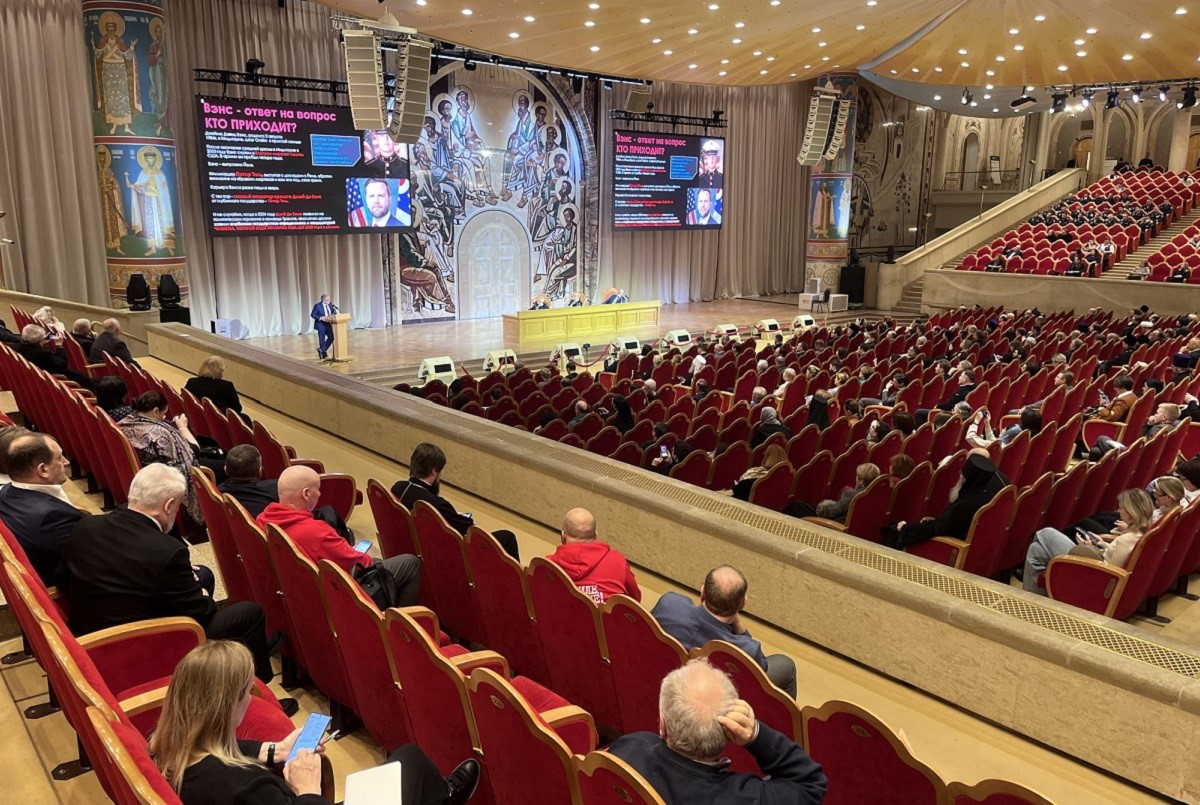Rector of St Petersburg University: "The state language must reflect core values"
Nikolay Kropachev, Rector of St Petersburg University and Member of the Bureau of the Presidium of the World Russian People’s Council, has participated in the 26th World Russian People’s Council. The event, themed "The Russian World: External and Internal Challenges," was held at Moscow’s Cathedral of Christ the Saviour.

Nikolay Kropachev co-chaired the panel session "From Value Ideology to the Formation of Value Institutions" alongside Aleksandr Shchipkov, Deputy Head of the World Russian People’s Council and Rector of the Russian Orthodox University of St John the Theologian St John the Theologian Russian Orthodox University, and Evgeniyi Tsybizov, Co-Chairman of the Novosibirsk Regional Branch of the World Russian People’s Council. During the session, Professor Nikolay Kropachev delivered a report on the implementation of the state language policy.
In his report, Professor Kropachev emphasised that the state language is a broad concept encompassing all spheres of public communication. Its mandatory use extends not only to legal texts and court decisions but also to public film screenings, literary performances, and media materials. It is therefore crucial that we should closely scrutinise its use and the values it conveys. Left unchecked, Professor Kropachev warned, the state language can become a conduit for ideas detrimental to culture.
Consider, for instance, the shift in language use where the term "sex," traditionally used to denote biological differences between females and males, is increasingly being supplanted by "gender." Unlike "sex," "gender" is a social construct, less rigidly tied to a person’s biological characteristics. In Europe, individuals can already choose (!) their gender. Even though in our country we have not adopted this approach, without vigilant control over the language of public communication, we risk mirroring the societal shifts witnessed in European countries.
Nikolay Kropachev, Rector of St Petersburg University, Member of the Bureau of the Presidium of the World Russian People’s Council
Rector Nikolay Kropachev underlined that it is insufficient merely to ponder over the role of language in reflecting the value picture of the world. We must also safeguard it from the infiltration of attitudes and values harmful to Russian culture and our spiritual and moral values system. To this end, in 2023, the Federal Law of the Russian Federation on the State Language was updated to establish new rules governing the use of the Russian language in public spaces. The amendments introduced requirements specifying which dictionaries and reference books set the official norms of the Russian language. After reviewing such publications, the Russian government approves a list of them. The development of one of the normative explanatory dictionaries was assigned to St Petersburg University.
Rector Nikolay Kropachev pointed out that an explanatory dictionary should describe the meanings of a word, taking into account its current use in the language. Furthermore, it should also bolster the Russian language by incorporating meanings rooted in traditional spiritual and moral values.
Compiling a normative explanatory dictionary is far too important and complex a social task for St Petersburg University scholars and experts to undertake alone. It is our common cause, a responsibility we all share as a society. Together, we must determine which meanings and values of words in our language deserve protection and preservation, for they embody the true culture and values of our people.
Nikolay Kropachev, Rector of St Petersburg University, member of the Bureau of the Presidium of the World Russian People’s Council
Nikolay Kropachev noted that a major shortcoming of the Federal Law on the State Language is its lack of an effective implementation mechanism. He explained that ‘police enforcement’ measures alone are unlikely to be sufficient in such cases. He argued that both the state and public oversight are needed to monitor what meanings are attributed to words.
Sergei Belov, Dean of the Faculty of Law at St Petersburg University, also spoke at the panel session, presenting on "Traditional Spiritual and Moral Values in the Explanatory Dictionary of the State Language." He revealed that while working to integrate the values outlined in Executive Order No 809 dated 9 November 2022, into the legal system, the University’s legal scholars encountered a significant challenge. The order defines traditional spiritual and moral values as abstract concepts, making the task of clarifying their meanings and specific content particularly difficult. To address this issue, it is essential that we unpack and formalise their content.
"Take, for example, the traditional value of 'life'. How are we to define its meaning?" asked Sergei Belov. "To begin with, the word itself has multiple interpretations, and describing each one of them involves broad concepts that can be ambiguous and imprecise. Furthermore, in the widely-used Explanatory Dictionary of the Russian Language by Sergey Ozhegov and Natalia Shvedova — often considered normative by philologists — 'life' is defined as 'physiological existence of a human being' or "human activity in one of its manifestations'. Clearly, neither of these interpretations captures 'life' as a traditional spiritual and moral value. To do so, the definition must convey its worldview significance."
Can we, like many dictionaries, define "милосердие" (mercy) merely as "the willingness to help or forgive someone out of compassion or humanity," which, in essence, is equating charity with mutual help and assistance?
Sergei Belov, Dean of the Faculty of Law at St Petersburg University
Sergei Belov emphasised that the task of elucidating the content of values is not only challenging, but also extremely responsible. Thus, he called for the establishment of an official platform to coordinate and consolidate the efforts of various social forces engaged in this work, including the traditional religions of the Russian Federation, with Orthodox Christianity occupying a special place.

